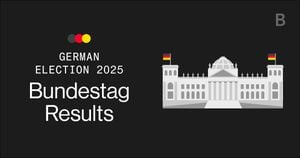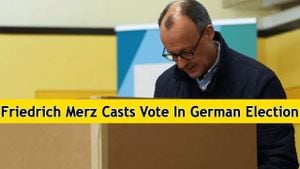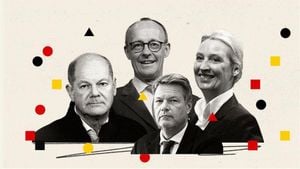Germany is gearing up for its state elections, with millions of voters heading to the polls and expectations running high. These elections, marked by early voting and heightened political tensions, signify a pivotal moment for the country as voters express their preferences through the ballot box.
Polling stations opened across the nation at 08:00, with almost 60 million eligible Germans poised to cast their votes. Notably, this election is held after the collapse of Chancellor Olaf Scholz's coalition government—a situation prompted by disputes over budgetary policies within the ruling alliance of Social Democrats (SPD), the Greens, and the Free Democrats (FDP).
Results from the early exit polls are set to be disclosed at 18:00, generating significant anticipation among election-watchers. With the latest polls indicating the Christian Democratic Union (CDU) leading steadily, closely followed by the far-right Alternative for Germany (AfD), the stakes could not be higher for the existing coalition parties.
Voter turnout has already shown promising signs, with reports indicating 52% participation by 14:00, significantly up from 36.5% during the last election. Many speculate this increase is partly owing to the heightened engagement following the breakdown of the previous government.
Among those eyeing the election results closely are key political players. Friedrich Merz, the CDU candidate, firmly stated, "The CDU will not govern with the AfD", reinforcing the party's strong stance against potential coalitions with far-right factions. Merz's position highlights the existential challenges faced by traditional parties as they grapple with rising extremist elements within the political framework.
Meanwhile, Chancellor Scholz has characterized this election as pivotal for his administration. The SPD has markedly shifted from being the dominant party to facing potential significant losses, raising concerns about its future relevance amid allegations of dissatisfaction with how the coalition has managed crises such as inflation and the war in Ukraine.
Reports also highlighted the atmosphere at polling stations across Germany. Groups protesting outside party offices drew attention to the heightened political passions of the day. The Fridays for Future movement staged demonstrations at the SPD headquarters, advocating for more aggressive climate policies, indicating the urgent expectations placed on candidates by the electorate.
A 100-year-old election worker, Lydia Mörs-Plattes, has become somewhat of a local celebrity after being recognized for her contributions at the voting booth—an endearing touch amid more serious political discussions.
Events took a tense turn, as local media reported instances of violence, including a man threatening another individual with a knife at a polling place. Authorities swiftly intervened, detaining the suspect without any injuries reported, underscoring the volatility around this election.
Football clubs even entered the fray, as players donned shirts with the slogan "Choose Democracy! Against Racism and Exclusion!" before their match, blending sport with political activism—a clear indication of the societal pulse on election day.
Looking toward potential coalition dynamics, analysts suggest possible scenarios where the CDU might regain the upper hand together with the SPD, reflecting on the historical footprint of 'Große Koalitionen'. Should the AfD gain ground, they are poised to play a significant role within the opposition, dictifying terms to any new government attempting to frame legislation on contentious issues.
With today’s events capturing public attention both within Germany and abroad, the outcomes of this election could resonate beyond its borders. Political observers are noting how shifts might influence Germany's relationships within the European Union, especially concerning collective stances on sanctions against Russia amid the pressing situation with Ukraine.
While projections suggest the chances of the SPD forming any viable coalition appear bleak, the future remains broadly uncertain. Voter sentiment and empirical data from today will shape the dialogue around which parties achieve widespread support and how the next government might address looming economic concerns. Will they tackle pressing national issues effectively, or will continued political fragmentation lead to more complicity and indecision within the halls of power?
Tonight, reports are promised to flow post-poll closure, emphasizing the political drama of this transformative election for the Federal Republic of Germany. We await the fate of not just seats won or lost, but of the very political fabric defining this key European nation.



